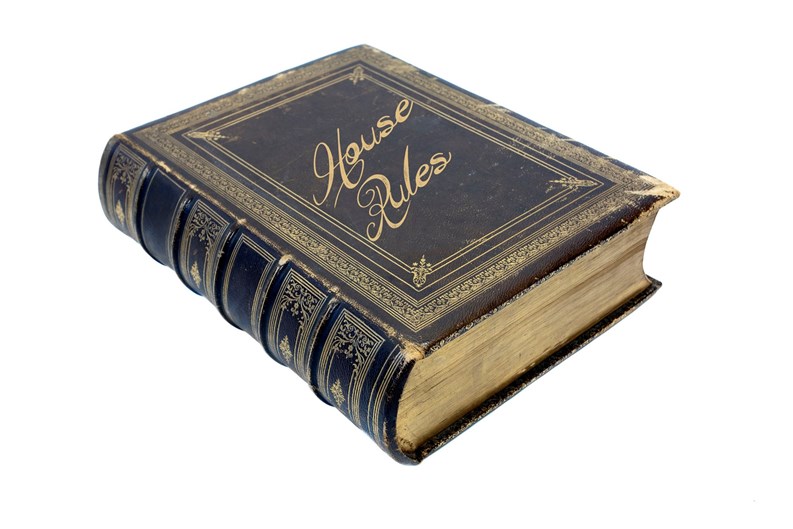Every co-op, condo, and HOA has rules and regulations that residents and their guests must abide by. For the most part, they’re usually pretty straightforward: no smoking in common areas, limits on pets, no hockey-playing in the hallways. These are ‘good’ rules rooted in common sense and drafted with the best interests of the community front and center.
Sometimes, however, a board will draft a rule that is biased, unenforceable, or that oversteps their powers. Others may try to level penalties against rule breakers that are either unrealistic or legally unsound. Some are just plain stupid. These ‘bad’ rules and enforcement policies do more harm than good; they foment resentment toward the board, animosity among neighbors, and can even invite litigation and subsequent legal costs. Let’s take a look at good rules—and bad.
The Nuts and Bolts of Rules
Not all rules are the same. In co-ops and condos, there are generally two different documents that govern what is and is not permissible: the governing documents (or bylaws), and the rules and regulations.
Bylaws are the equivalent of the Constitution for a co-op or condo—the papers signed by the founding mothers and fathers of the building. “That document talks a lot about the governance [of the building],” says Brendan Keany, General Manager of Penn South Co-Op, in Manhattan. “It talks a lot about the election of the board, the terms or the board, the ability of the board to have committees, and delegate duties and responsibilities. It deals with a lot of what I call ‘the fundamentals.’ The very serious stuff.”
By contrast, the rules and regulations are more like a series of amendments to the bylaws. “It’s more of a working document,” Keany says. “It’s a little bit like how we all live, and if we abide by the rules. Most of them are listed, either specifically or in general terms, within the occupancy or proprietary lease.” These include things like noise prohibitions, and whether or not the owners in a building can have cats.
Needless to say, the two kinds of rules are not the same—legally or otherwise. “The main difference between house rules and the rules in the governing documents is one of enforceability,” says Howard Dakoff, an attorney with the firm of Levenfeld Pearlstein, LLC, in Chicago. “Unless there’s a violation of constitutional rights, governing documents are presumed valid by the courts – so there’s a presumption of [the bylaws’] validity. Rules and regulations, on the other hand, are subject to what we call judicial scrutiny, at least here in Illinois. This means the judge can review whether he or she thinks the rule is reasonable or unreasonable. So if it’s in the governing documents’ declaration of bylaws, the judge doesn’t have the ability to say, ‘I don’t think that’s reasonable.’ Unless it violates a constitutional right, it’s enforceable. Whereas with a rule, the judge has latitude to say, ‘I don’t like that rule. I think it’s overreaching, and therefore I can strike it down.’”
The Rules of Making Good Rules
The rules that tend to change are ones that govern quotidian behavior. There tends not to be much fuss made about things like how long board terms are, or who is empowered to form committees. What residents care about are matters that affect how they live their day-to-day lives: Does the fidgety upstairs neighbor with her stiletto-heeled Manolo Blahniks have the requisite amount of carpet on the floor? Do I need to hide evidence of my cat when the super drops by? At what point can the death metal guitarist next door be made to use headphones?
“Good rules are comprehensive but do not over-regulate resident behavior,” says Scott A. Rosenlund of the law firm Fullett Rosenlund Anderson P.C., which has offices in Chicago and Lake Zurich, Illinois. “They are precisely written, but not overly punitive in tone, and are consistent with – but not a restatement of – the other governing documents. Of course, rules should be drafted to fit a specific property, conform with applicable laws, be adopted in accordance with required rule-making procedures, and be reasonable in both substance and application.”
As a general rule (pun intended), rules that exist before a shareholder or owner buys into the building are the best kind of rules. After all, how loudly can someone complain when they knew what they were buying into before they signed on the line? “As a general rule, it’s always preferred to have restrictions in the governing documents that are either recorded against the property before anyone buys, or amended by the unit owners,” Dakoff says. “[The latter] requires owner consent, because there’s a higher presumption of validity.”
As with any rule, there’s both the letter and spirit of the law. Buildings tend to run more smoothly when the latter carries more weight than the former. No one wants Les Misérables’ Javert enforcing the house rules, clapping residents in irons for the slightest infraction.
“A lot depends on who you have on the board,” says Keany. “You have sometimes very thoughtful, capable people who think things through--and then you have some people who want to be reactionary and get mired in the weeds. They may not be the happiest people, and they allow this to bleed into their reactions to things. I try to guide our board to make rules that are reasonable.”
Points of Contention
In matters of day-to-day life, different people hold different views on any number of areas, and these views color the culture of a building. For example, consider dogs.
“Many, many years ago, Penn South didn’t permit dogs,” says Keany. “They were strictly not allowed under our occupancy agreement. And the board had an advisory referendum with the shareholders, and they moved to permit dogs with certain limitations. And that was a new house rule that was not intended in the original occupancy agreement, but that was adopted, posted, and shareholders notified, and now it’s part of how we operate every day. There are dos and don’ts surrounding that to some degree, but there is within most proprietary leases and occupancy agreements the ability to change a rule, or insert a new rule, or modify an existing rule.” ‘Modifying’ an existing rule, he adds, might mean eliminating it entirely.
Penn South’s move to allow dogs had its opponents, and indeed still does. “We still have an ‘anti-dog’ faction,” Keany says, “and the people who walk their dogs are often resentful of these people telling them what to do, or complaining about which spot their dog chooses to pee in. But with all due respect, the dog is going to pee someplace. He’s outside now, and he’s not a human being… he’s not going to hold it until a particular resident decides it’s the appropriate place.”
Who knows – it may be that, at some future date, Penn South has a change of heart about Fido and Spot. Rules can be rescinded, and they can be re-rescinded if a building community and its board so wish.
Getting the Ball Rolling
“Assuming that the co-op operates with a reasonable amount of openness and democracy, it isn’t difficult for a resident to complain about an unfair or unnecessary rule,” Keany says. “[A resident] can write a letter to the president of the board or to the managing agent asking that the board be alerted to this.”
Keany says that for his part, a letter directly to the board, rather than the managing agent, is the way to go. “Because it reminds the elected board members that they’re accountable to the shareholders,” he says. “And this holds true for the opposite situation as well, when there isn’t a rule prohibiting a certain thing, but residents think that there should be one.”
Approving new rules is different, depending on which document is being amended. According to Dakoff, “Rules and regulations are approved by the board only, whereas an amendment to the restrictions in the governing documents – meaning the declaration or bylaws – requires unit owner consent. In Illinois, our statute has a range. It’s to be no less than two-thirds, and no more than 75 percent. Also, when you amend governing documents, you have to look and see if there are any restrictions requiring mortgagee approval. For certain types of restrictions, you may even need mortgagee consent. So amending the governing documents is a much more onerous procedure.”
This is not generally the case with house rules. “With rules and regulations, the board just drafts whatever it thinks is reasonable,” Dakoff explains, adding that it’s not the role of legal counsel to weigh in on the merits of a particular rule. “Hopefully they have their attorney review it for consistency with the governing documents and state law. [But] we don’t review to say whether or not they should have a hallway floor mat rule or not. We don’t make determinations as to whether it’s a ‘good’ rule or a ‘bad’ rule. We will definitely comment if we think it’s an outlier rule, but we’re really reviewing it for consistency with the governing documents and consistency with applicable law.”
At the end of the day, rules and regulations are in place to make your building or HOA more pleasant to live in—for everyone. “What I always counsel clients is, ‘There is a balance,’” says Dakoff. “The rules are meant to incentivize the harmonious living of a significant number of people who are physically on top of each other.”
Keany agrees. “If you live in a co-op,” he says, “you’re supposed to be cooperative. If you live to that principle, then maybe a lot of these rules aren’t needed.”
Greg Olear is a freelance writer and published novelist, and a frequent contributor to The Cooperator.










Leave a Comment